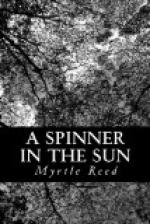After all, there had never been anything but happiness in the house—the misery had been outside. Peace and quiet content had dwelt there securely, but the memory of it brought no balm now.
As though it were yesterday, the black walnut chair, covered with haircloth, stood primly against the wall. Miss Evelina had always hated the chair, and here, after twenty-five years, it confronted her again. She mused, ironically, upon the permanence of things usually considered transient and temporary. Her mother’s sewing was still upon the marble-topped table, but the hands that held it were long since mingled with the dust. Her own embroidery had apparently but just fallen from the chair, and the dream that had led to its fashioning—was only a dream, from which she awoke to enduring agony. With swift hatred, she turned her back upon the embroidery frame, and hid her face in her hands.
Time, as time, had ceased to exist for her. She suffered until suffering brought its own far anodyne—the inability to sustain it further,—then she slept, from sheer weariness. Before dawn, usually, she awoke, sufficiently rested to suffer again. When she felt faint, she ate, scarcely knowing what she ate, for food was as dust and ashes in her mouth.
In the bag that hung from her belt was a vial of laudanum, renewed from time to time as she feared its strength was waning. She had been taught that it was wicked to take one’s own life, and that God was always kind. Not having experienced the kindness, she began to doubt the existence of God, and was immediately face to face with the idea that it could not be wrong to die if one was too miserable to live. Her mind revolved perpetually in this circle and came continually back to a compromise. She would live one more day, and then she would free herself. There was always a to-morrow when she should be free, but it never came.
The fire died down and the candle had but a few minutes more to burn. It was the hour of the night when life is at its lowest—when souls pass out into the great Beyond. Miss Evelina took the vial from her reticule and uncorked it. The bitter, pungent odour came as sweet incense to her nostrils. No one knew she had come. No one would ever enter her door again. She might die peacefully in her own house, and no one would know until the walls crumbled to dust—perhaps not even then. And Miss Evelina had a horror of a grave.
She drew a long breath of the bitterness. The silken leaves of the poppies—flowers of sleep—had been crushed into this. The lees must be drained from the Cup of Life before the Cup could be set aside. Every one came to this, sooner or later. Why not choose? Why not drain the Cup now? When it had all been bitter, why hesitate to drink the lees?
The monstrous and incredible passion of the race was slowly creeping upon her. Her eyes gleamed and her cheeks burned. The hunger for death at her own hands and on her own terms possessed her frail body to the full. “If there had been a God in Heaven,” she said, aloud, “surely I must have died!”




